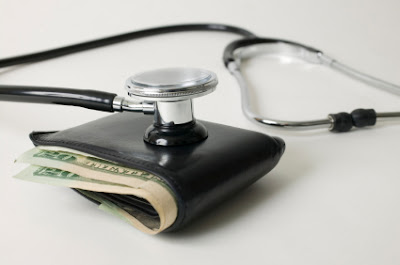As the saying goes, "If you don't have your health, you don't have anything". This next pillar of insurance planning, health insurance, seems to elude so many of us. In 2008, there were nearly 47 million Americans or approximately 20% of the population under age 65 without health insurance.
Furthermore, thanks in no small part to the 2008-2009 recession and the resulting job losses that accompanied it, unemployment has been hovering around 10%. This high percentage of unemployment means that nearly 60 million people will be without health insurance coverage! This of course can be detrimental to your financial freedom.
 |
| Health Insurance Is Key To Your Financial Freedom |
Furthermore, thanks in no small part to the 2008-2009 recession and the resulting job losses that accompanied it, unemployment has been hovering around 10%. This high percentage of unemployment means that nearly 60 million people will be without health insurance coverage! This of course can be detrimental to your financial freedom.
When searching for health insurance, keep in mind that "cheaper" is not always better. There are quite a few variables that go into making up your premium. Things like deductibles, co-pays, your use of in-network or out-of-network doctors and facilities, all contribute to your final monthly premium. If you are the "healthy" type, you can reduce your expenses by considering a plan with catastrophic coverage. Under this scenario, you would have a high deductible before the insurance kicks in. Presumably this will not matter at all because your health history shows that you do not use the system very much. If you are willing to withstand a $2,500.00 to $3,000.00 deductible or more, you could potentially lower your health insurance premium by about 50%.
Lowering your premium can also be accomplished by choosing a managed care plan. Deductibles and co-pays will decrease if you are willing to give up your choice of doctors and facilities. On the other hand, if you like your freedom, a traditional fee for service a.k.a., an indemnity plan, is the right choice for you. Ideally, you need to factor in the benefits that are most important to you while being mindful of costs and restrictions when putting your health insurance plan in place.
Let's not forget about tax breaks that are available for health insurance. Those that are self-employed can usually deduct 100% of the insurance premium from your pretax income. Employees, on the other hand, should check with their employer to see if they offer a Flexible Spending Account (F.S.A.), or Health Savings Account (H.S.A.). Both accounts allow you to set aside pretax income for certain qualifying medical expenses. This has the effect of lowering your taxable income. You will then reap the tax break of paying less taxes. There is no limit on how much you can set aside but you need to spend this account within the calendar year or you will forfeit the unspent funds.
Last but not least, if you lose your job, you can generally continue your health care coverage through C.O.B.R.A., (Consolidated Omnibus Budget Reconciliation Act), for up to 18 months, and sometimes longer if you meet certain qualifications. You would be able to stay on your ex-employers health insurance plan although they are allowed to charge you a small administration fee (2%). Do not be foolish and try to get by without health insurance. If you get seriously sick, your financial freedom will be in jeopardy if you have no health insurance coverage.
Lowering your premium can also be accomplished by choosing a managed care plan. Deductibles and co-pays will decrease if you are willing to give up your choice of doctors and facilities. On the other hand, if you like your freedom, a traditional fee for service a.k.a., an indemnity plan, is the right choice for you. Ideally, you need to factor in the benefits that are most important to you while being mindful of costs and restrictions when putting your health insurance plan in place.
Let's not forget about tax breaks that are available for health insurance. Those that are self-employed can usually deduct 100% of the insurance premium from your pretax income. Employees, on the other hand, should check with their employer to see if they offer a Flexible Spending Account (F.S.A.), or Health Savings Account (H.S.A.). Both accounts allow you to set aside pretax income for certain qualifying medical expenses. This has the effect of lowering your taxable income. You will then reap the tax break of paying less taxes. There is no limit on how much you can set aside but you need to spend this account within the calendar year or you will forfeit the unspent funds.
Last but not least, if you lose your job, you can generally continue your health care coverage through C.O.B.R.A., (Consolidated Omnibus Budget Reconciliation Act), for up to 18 months, and sometimes longer if you meet certain qualifications. You would be able to stay on your ex-employers health insurance plan although they are allowed to charge you a small administration fee (2%). Do not be foolish and try to get by without health insurance. If you get seriously sick, your financial freedom will be in jeopardy if you have no health insurance coverage.
No comments:
Post a Comment